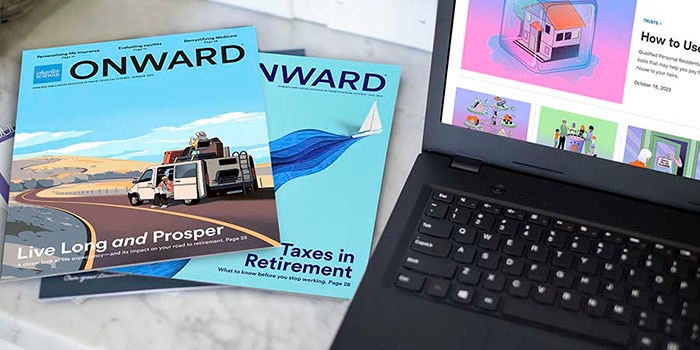
Q
I was asked to join the board of a nonprofit that I've been involved with for quite some time. I'm excited to engage on a deeper level, but I assume the role will have both personal and financial implications. What should I consider before I decide?
A
Serving on a nonprofit board is a wonderful way to participate in a cause that's close to your heart. Having served on several boards myself, I know how rewarding it can be. But I also don't want to sugarcoat it: Becoming a board member is a significant undertaking. Depending on the organization, the role could require an outsize time commitment, to say nothing of the financial support that is typically expected from board members.
Whether a board role is right for you will depend on several factors, including your personal circumstances and the organization's financial health, accountability, and effectiveness. Let's look at five considerations to help inform your decision.
1. Time and temperament
First and foremost, consider the time obligation. Find out how often the board meets and how long the meetings last, as well as what advance prep (such as reviewing financial statements) is required for each meeting. Also consider what other events, such as fundraisers, you'll be expected to attend.
If it feels manageable from a time perspective, there's still the question of work environment. A board is a collaborative body that requires teamwork and compromise. It also involves providing executive governance rather than day-to-day support, so if you're someone who likes to be on the ground doing the work, a board role may not be the best fit. Conversely, if you excel in leadership positions, serving on a board lets you apply your expertise to help an organization that's meaningful to you.
2. Financial commitment
Most boards require members to make a minimum financial contribution per year through a personal gift, fundraising, or both. Are you prepared to support the organization at that level?
Fortunately, some employers offer matching gifts to nonprofits, which can help satisfy this requirement. At Schwab, for example, employees' donations are matched up to an annual limit. That benefit made my own decision to join a nonprofit board much easier from a financial standpoint.
3. Legal protections
Board members make major decisions about how a nonprofit is run, from approving budgets and setting goals to hiring and firing employees. If the organization is ever sued for wrongdoing—say, by an employee who feels they were unjustly terminated—the board members could be held liable for their part in the decision-making process. That's why it's critical to confirm the organization has adequate directors and officers (D&O) liability insurance or similar, which protects board members from personal liability. You should also ask whether the organization has ever used this insurance or has any pending litigation.
If you accept the role, I suggest you also consider taking out a personal umbrella insurance policy with D&O coverage—even if the organization has an adequate policy. Umbrella coverage kicks in after an existing policy is exhausted, adding an extra layer of protection in the event a lawsuit is brought against you. A qualified insurance agent can advise you on the best type of coverage for your situation.
4. Financial health
Before you agree to become a board member, it's important to understand how the nonprofit is faring so you can determine whether it's viable on an ongoing basis. Ask to review the organization's budget and profit and loss statement, as well as its IRS Form 990, which lists employee compensation, expenses, revenue, and other key financial details from the prior tax year.
If the organization is reluctant to share this information, that could indicate financial challenges or other red flags. Be sure you get any questions and concerns addressed to your satisfaction before saying yes.
5. Track record
Finally, you'll want to find out whether the board is a competent governing body and the organization is effectively achieving its mission. As you review the organization's financials, pay attention to how the board is spending money and managing assets. For example, are they fairly compensating employees? Managing cash reserves prudently? Making wise decisions with the organization's investments? Achieving the intended impact?
Also investigate the board's composition and how it handles other areas of governance, including policies and procedures. Do board members possess the skills and experience to provide effective leadership? Are their roles and responsibilities clearly defined? Are employees protected via clear HR policies and escalation practices? Resolving existing governance challenges is a common goal for nonprofit boards, and answers to these questions can help you determine not only how successful the board is in fulfilling its mission but also the scope of the work you may face once you join.
Worth the effort
Serving as a board member can be an enriching experience that allows you to make a direct impact on a nonprofit. It can also be an opportunity to learn new skills, gain fresh perspectives, and even grow your network with people who have similar values. Doing your homework will help ensure the role is a good fit for you personally and the organization is one that you can feel proud to represent.
Discover more from Onward

Keep reading the latest issue online or view the print edition.
The information provided here is for general informational purposes only and should not be considered an individualized recommendation or personalized investment advice. The investment strategies mentioned here may not be suitable for everyone. Each investor needs to review an investment strategy for his or her own particular situation before making any investment decision.
All expressions of opinion are subject to change without notice in reaction to shifting market conditions. Data contained herein from third-party providers is obtained from what are considered reliable sources. However, its accuracy, completeness, or reliability cannot be guaranteed.
Examples provided are for illustrative purposes only and not intended to be reflective of results you can expect to achieve.
Schwab Wealth Advisory™ ("SWA") is a non‐discretionary investment advisory program sponsored by Charles Schwab & Co., Inc. ("Schwab"). Schwab Wealth Advisory, Inc. ("SWAI") is a Registered Investment Adviser and provides portfolio management for the SWA program. Schwab and SWAI are affiliates and are subsidiaries of The Charles Schwab Corporation.
1123-3K8E

